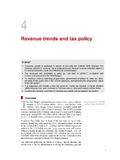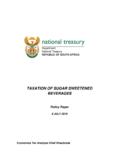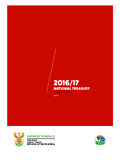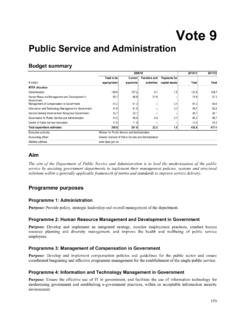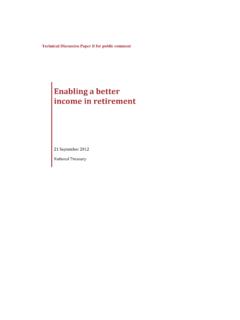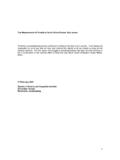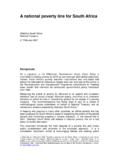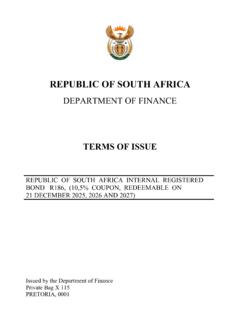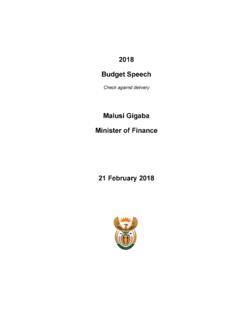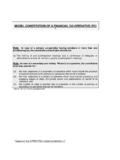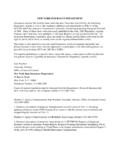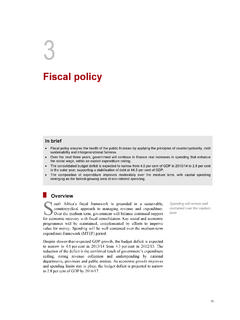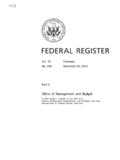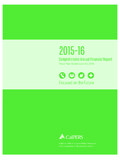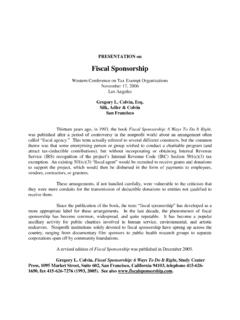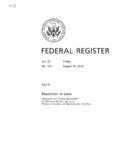Transcription of A FRAMEWORK FOR CONSIDERING MARKET …
1 DRAFT policy PAPER. A FRAMEWORK FOR CONSIDERING . MARKET - based instruments TO. support environmental fiscal . REFORM IN SOUTH AFRICA. April 2006. National Treasury Tax policy Chief Directorate DISCLAIMER. This draft policy paper reflects the preliminary views of the National Treasury and not necessarily those of Government. It should be noted that the document is being released in order to facilitate open and frank discussions on the subject of environmental fiscal reform. This will assist Government to formulate well-considered tax proposals, which will be informed by the needs of the country and international trends.
2 Table of Contents EXECUTIVE I. CHAPTER 1: 1. SCOPE OF THE policy PAPER .. 2. DEFINITIONS .. 3. OBJECTIVES OF THE policy PAPER .. 6. CHAPTER 2: SOUTH AFRICA'S SUSTAINABLE DEVELOPMENT AND. environmental OBJECTIVES .. 10. SUSTAINABLE DEVELOPMENT IN SOUTH AFRICA .. 11. MEASURING PROGRESS TOWARDS SUSTAINABLE DEVELOPMENT .. 13. AN OVERVIEW OF environmental PRIORITIES FOR SOUTH AFRICA .. 16. ECONOMIC VALUATION OF environmental GOODS AND SERVICES .. 22. CHAPTER 3: SOUTH AFRICA'S TAX SYSTEM .. 26. PRINCIPLES OF TAXATION.
3 26. TAX INCIDENCE .. 27. AN OVERVIEW OF TAX REFORM SINCE 1994 .. 28. fiscal DECENTRALIZATION .. 31. CURRENT ENVIRONMENTALLY-RELATED TAXES AND CHARGES .. 33. THE ROLE OF ENVIRONMENTALLY-RELATED TAXES IN FUTURE TAX REFORMS .. 38. CHAPTER 4: IDENTIFYING APPROPRIATE INTERVENTIONS TO CORRECT FOR. MARKET FAILURES .. 41. MARKET FAILURE AND THE ENVIRONMENT .. 41. OPTIONS FOR GOVERNMENT INTERVENTION .. 43. CHOOSING BETWEEN DIFFERENT policy OPTIONS .. 49. THE APPROPRIATE LEVEL OF GOVERNMENT INTERVENTION .. 52. THE policy DEVELOPMENT PROCESS.
4 53. CHAPTER 5: CRITERIA FOR ASSESSING ENVIRONMENTALLY-RELATED TAXES56. PRINCIPLES OF ENVIRONMENTALLY-RELATED TAXATION .. 56. CRITERIA FOR ASSESSING ENVIRONMENTALLY-RELATED TAXES .. 56. CHAPTER 6: OPTIONS FOR environmental fiscal REFORM MEASURES IN. SOUTH AFRICA .. 65. USER CHARGES, LEVIES AND ADMINISTRATIVE FEES .. 65. OPTIONS FOR REFORMING EXISTING ENVIRONMENTALLY-RELATED TAXES .. 70. OPTIONS FOR DEVELOPING ENVIRONMENTALLY-RELATED TAXES .. 78. OPTIONS FOR REFORMING NON-ENVIRONMENTALLY-RELATED TAX LAWS WITH.
5 PERVERSE environmental INCENTIVES .. 85. ( fiscal ) INCENTIVES TO IMPROVE environmental OUTCOMES .. 89. REVENUE HYPOTHECATION .. 101. CHAPTER 7: 104. BIBLIOGRAPHY .. 106. Executive Summary ANNEX 1: TAX REVENUE TRENDS .. 111. ANNEX 2: environmental VALUATION IN SOUTH 116. ANNEX 3: MAKING GROWTH GREEN - environmental DUTY, THE WORLD. BANK .. 123. List of Tables Table 1: Waste generation in South Africa in 1998 .. 21. Table 2: An overview of some valuation techniques and their potential applicability .. 25. Table 3: Environmentally-related taxes and charges in South Africa (2005/2006).
6 34. Table 4: Revenues from environmentally-related taxes in South Africa .. 39. Table 5: policy matrix of interventions to correct for environmental MARKET 43. Table 6: Guiding principles of environmentally-related taxation .. 57. Table 7: Options for reforming existing environmentally-related 70. Table 8: Proposed fuel tax FRAMEWORK for South 73. Table 9: Options for developing new environmentally-related 79. Table 10: Water use by sector in South 82. Table 11: Possible reform options to reduce perverse environmental incentives.
7 86. Table 12: Use of environmentally-related tax revenues in the 92. Table 13: Review of specific tax provisions to incentivise conservation activities .. 96. List of Figures Figure 1: Gross, net and adjusted (or genuine) savings for South Africa: 1970-2001 .. 15. Figure 2: A process for CONSIDERING the application of MARKET - based instruments .. 55. Figure 3: Suggested criteria for assessing environmentally-related tax proposals .. 58. Figure 4: Waste management 75. List of Boxes Box 1: Classifying environmentally-related taxes and 4.
8 Box 2: Examples of environmental MARKET 42. Box 3: Examples of information disclosure programmes in South Africa .. 45. Box 4: The Indonesian Programme for Pollution Control Evaluation and Rating (PROPER).. 47. Box 5: The South African ROSE Foundation .. 48. Box 6: Plastic bags and the use of voluntary agreements in South 48. Box 7: China's system of pollution taxes and 51. Box 8: Taxes and user-charges in an environmental 68. Box 9: Applying the polluter-pays 69. Box 10: Sweden's refunded NOx emissions payments.
9 80. Box 11: Tradable water rights in 83. Box 12: Recent amendments to New Zealand's tax depreciation 95. Executive Summary Box 13: Tax measures to promote conservation in Australia .. 100. Executive Summary EXECUTIVE SUMMARY. Introduction Sustainable development is about enhancing human well-being over time and managing a broad portfolio of economic, social and environmental assets that society has at its disposal in order to sustain a flow of consumption1. As the South African economy continues to develop, it is increasingly important to ensure that it does so in a sustainable way and that, at the same time, issues of poverty and inequality are effectively addressed.
10 It is, therefore, important to appreciate that it's not just the quantity of growth that matters, but also its quality. The aim of this policy paper is to outline the role that MARKET - based instruments , specifically environmentally-related taxes and charges, could play in supporting sustainable development in South Africa, and to outline a FRAMEWORK for CONSIDERING their potential application. The paper focuses on the options for environmental fiscal reform and the policies and measures capable of contributing to both revenue requirements and environmental objectives.
